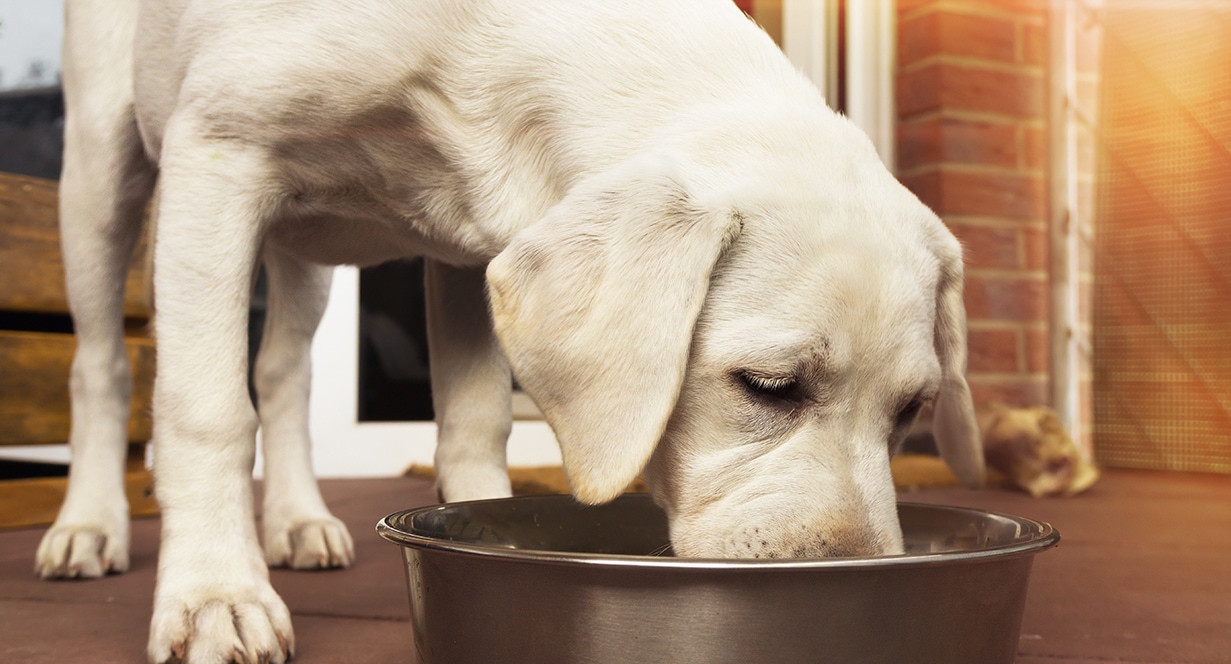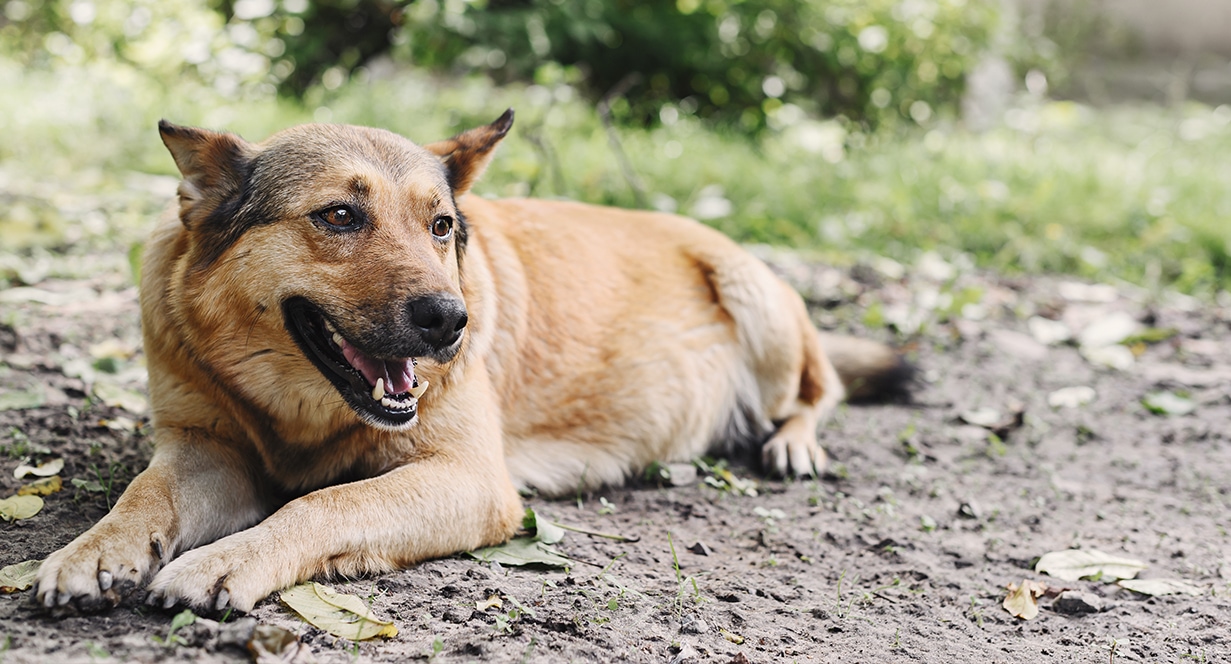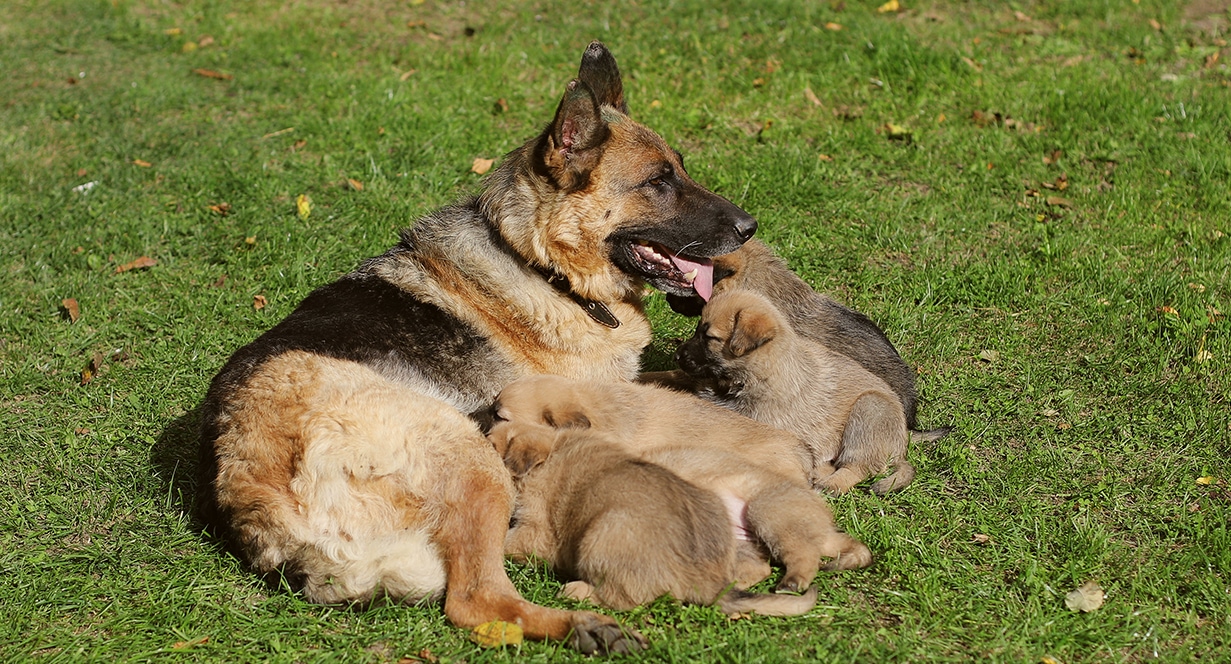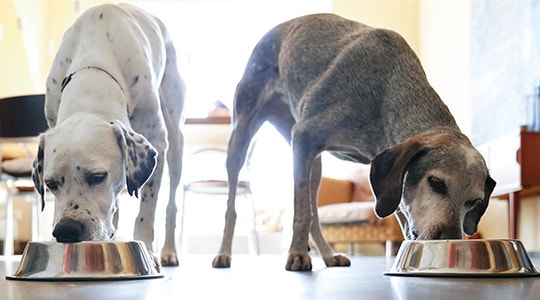
DIET AND NUTRITION FOR PREGNANT AND NURSING DOGS
There are a lot of moving parts to prenatal care — like feeding schedules, monitoring the growth and health of your dog and their pups, and preparing for delivery. During this entire journey, it’s important that the dog and their pups get the proper nutrition. Each dog is different, so understanding your dog’s health is crucial before deciding what food to feed them and when.
Before breeding your dog, start by consulting with your vet; they can assess your dog’s overall physical health and check for abnormalities that may cause complications during the pregnancy or birth. Your vet can also give you an idea of how your dog’s weight, breed and age may play a role in their pregnancy. During this consultation, your vet can also help you use this information to decide the best approach for your dog and their future pups. This includes a feeding schedule, any supplemental nutrition and the food that best meets the needs of your dog and their pups (once they’re old enough.)
Before Pregnancy: Plan Ahead for Your Dog
Like any mammal, a pregnant dog provides all the nutrients to their pups before birth. Even after birth, your dog’s nutrition levels can play a major role in promoting proper lactation and happy, growing pups. It also helps your dog support their immune system, which fights off infections that may compromise your dog’s and their pups’ health. Remember, your dog is now eating for their body and the puppies they’re growing!
Pregnancy and nursing not only change your dog’s eating habits and body but also change their lifestyle. If your dog is pregnant or nursing, pay special attention to their developing nutritional needs as they carry, deliver and nurse their puppies. Just like every dog is different, their needs during pregnancy will be, too. Depending on a dog’s breed, size, health and age, your feeding plan may be personalized to ensure proper feeding. That’s why it’s best to work in tandem with your vet to ensure your dog’s unique needs are met during their pregnancy journey.
Because of the physical demands of pregnancy and nursing, a dog with less-than-ideal health can experience problems:
- An underweight dog often has difficulty consuming enough food to support both their own nutritional needs and those of their developing puppies.
- Overweight dogs may experience abnormal or difficult labor because of large fetuses.

To ensure you’re feeding your dog the proper amounts of a complete and balanced diet, the AKC recommends (opens in new window) a highly digestible commercial diet that has adequate amounts of protein and fat to help your dog support the growth of their pups. The AKC also recommends gradually increasing food intake during pregnancy to ensure healthy weight gain and adequate caloric intake. This will support the mother's weight and body condition before breeding and help maintain their health and that of their babies throughout pregnancy and lactation.
The best diet for pregnant and nursing dogs is a high-quality, nutrient-dense dog food formulated for all life stages or for growth. Although puppy diets are generally recommended for pregnant or nursing dogs, large-breed puppy formulas may not be appropriate for this use due to their adjusted energy and mineral content.
The energy requirements of pregnant dogs are reflected in the pattern of weight gain. Pregnant dogs will need to consume 25% to 50% more than their normal food intake by the end of pregnancy, but energy requirements do not increase until about the sixth week.
It's not likely your dog will need additional supplements outside of the food you choose during breeding, so long as their diet meets their nutritional needs during pregnancy and nursing. This may be decided after your vet consultation, where blood testing can provide more information on conditions like hypoglycemia and anemia.
Avoid feeding your dog anything other than what’s included in their meal plan. Things like table scraps and meat can compromise their diet during pregnancy. Keeping your dog on a consistent diet makes it easier to know when they’re sick or suffering from complications related to their pregnancy, because it rules out any chance it could be a reaction to new foods. A consistent diet also makes it easier to ensure they’re getting all the nutrients they need and staying hydrated without upsetting their stomach.
Improper feeding not only affects the dog giving birth, but the puppies, too. Supporting your dog’s nutritional needs during pregnancy and lactation can help avoid malnourishment, thinning hair on your dog, poor milk production and labor issues.

Pregnancy: Monitor Your Dog’s Weight Gain
After deciding on a proper meal plan, you and your vet will need to monitor your dog to ensure they are gaining the proper amount of weight and maintaining adequate energy levels during pregnancy. The gestation period for dogs is nine weeks. Pregnant dogs gain weight only slightly until about the sixth week, and then gain weight rapidly.
Once your dog is ready to give birth, they may lose their appetite before showing signs of being in labor. If you notice your dog is refusing food, and you suspect it may be because they are in labor, provide them with water and/or ice to avoid dehydration. Proper hydration can help avoid complications, especially if they are refusing food.
Closely after birth, your dog may still be avoidant of food. Whether that is because they are too tired to eat or because they are tending to their pups, be sure to encourage them to consume something as soon as possible. Their food should continue to be highly nutritional and highly palatable to maintain health and energy as they lactate and care for their new puppies. If anything, always be sure to promote your dog’s hydration. If they will not eat closely before, during or after birth, they should at least remain as hydrated as possible.
Nursing: Make Sure Your Dog Gets Sufficient Nutrition
Pregnant dogs lose weight after giving birth, but their nutritional needs increase dramatically. Depending on litter size, nursing dogs might need two to three times their normal food requirement to nourish their pups. Be sure your nursing mom has plenty of water so they can generate the milk volume they need to feed the litter.
During the entire pregnancy, you may notice your dog’s interest in food fluctuate. It’s normal for dogs to lose and regain their appetite throughout their pregnancy, especially immediately after birth or while their puppies are still very young. If at any time your dog becomes weak, lethargic or refuses to eat for long periods, reach out to your vet to ensure there aren’t any complications. By the time the signs of malnourishment are evident, it may be too late to intervene before complications occur. That’s why it’s extremely important to work with your vet and observe your dog closely. This is especially important during and after birth, when they must begin nursing and caring for their litter.

To help your nursing dog get enough nutrition, you can try several tactics:
- Feed a nutrient-dense diet such as puppy food.
- Without increasing the amount of food offered at a meal, increase the number of meals throughout the day.
- Free-choice feed them, offering unlimited access to dry food throughout the day.
Weaning: Return to a Pre-pregnancy Diet
By four to five weeks after birth, most puppies are showing an interest in their mother’s food. Gradually, the puppies will begin eating more solid food and nursing less. At the same time, the nursing mother will usually begin eating less. Most puppies are completely weaned around age 7 to 8 weeks. By this time, the mother's energy requirement is back to normal, and they should be eating their normal pre-pregnancy diet.
As the puppies grow, it’s best to keep them on a nutrient dense puppy food until they are old enough to transition to an adult dog food. This can vary from puppy to puppy but usually depends on size. For both puppy and mother, be sure to transition foods slowly to allow them time to adjust. Gradually mix the new food in with the old food until you can fully transition from one to the other — this will give their bodies time to adapt to the new food. No matter what stage of life your dog is in, there are a lot of great flavors and options to choose from.
If you’re unsure where to begin selecting a dog food for your puppies or dog, check out our Dog Food Selector Quiz to find a good match.




